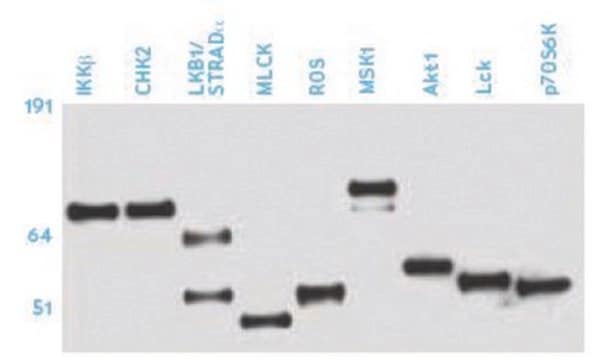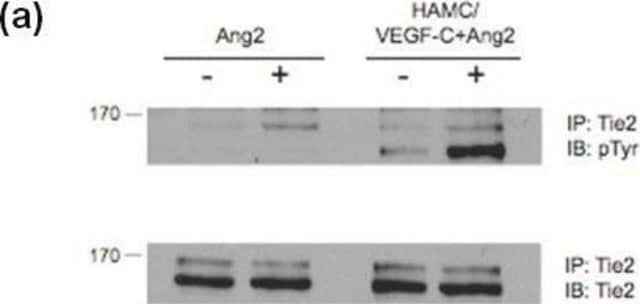05-1050-M
4G10® Platinum, Anti-Phosphotyrosine Antibody (mouse monoclonal cocktail IgG2b)
clone 4G10®, Upstate®, from mouse
Synonyme(s) :
Anti-phosphotyrosine antibody
About This Item
Produits recommandés
Source biologique
mouse
Niveau de qualité
Forme d'anticorps
purified immunoglobulin
Type de produit anticorps
primary antibodies
Clone
4G10®, monoclonal
Réactivité de l'espèce (prédite par homologie)
all
Fabricant/nom de marque
Upstate®
Technique(s)
ELISA: suitable
flow cytometry: suitable
immunocytochemistry: suitable
immunofluorescence: suitable
immunohistochemistry: suitable
immunoprecipitation (IP): suitable
western blot: suitable
Isotype
IgG2b
Modification post-traductionnelle de la cible
phosphorylation (pTyr)
Description générale
Spécificité
Immunogène
Application
Signaling
General Post-translation Modification
Qualité
Western Blot Analysis: 1:1,000-1:2,000 of this antibody detected tyrosinephosphorylated proteins in a modified RIPA lysate from EGF-treated human A431 carcinoma cells.
Description de la cible
Forme physique
Liquid at 2-8°C.
Stockage et stabilité
Remarque sur l'analyse
Suggested Positive Antigen Control: Cat. # 12-302, EGF-stimulated A431 cell lysate is provided as a free positive antigen control for western immunoblotting. Aliquot as desired, refreeze immediately, and store at -20ºC. The lysate is stable for 6 months at -20ºC. Before use, add 2.5 μL of 2-mercaptoethanol per 100 μL of lysate and boil for 5 minutes to reduce the preparation. Load 20 μg of reduced lysate per lane for immunoblot analysis.
Informations légales
Clause de non-responsabilité
Vous ne trouvez pas le bon produit ?
Essayez notre Outil de sélection de produits.
Code de la classe de stockage
12 - Non Combustible Liquids
Classe de danger pour l'eau (WGK)
WGK 1
Point d'éclair (°F)
Not applicable
Point d'éclair (°C)
Not applicable
Certificats d'analyse (COA)
Recherchez un Certificats d'analyse (COA) en saisissant le numéro de lot du produit. Les numéros de lot figurent sur l'étiquette du produit après les mots "Lot" ou "Batch".
Déjà en possession de ce produit ?
Retrouvez la documentation relative aux produits que vous avez récemment achetés dans la Bibliothèque de documents.
Notre équipe de scientifiques dispose d'une expérience dans tous les secteurs de la recherche, notamment en sciences de la vie, science des matériaux, synthèse chimique, chromatographie, analyse et dans de nombreux autres domaines..
Contacter notre Service technique







